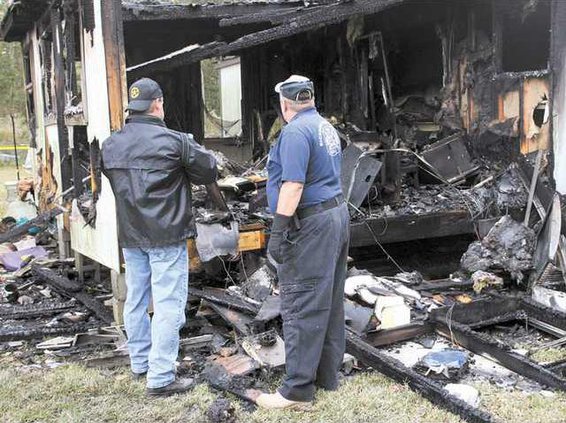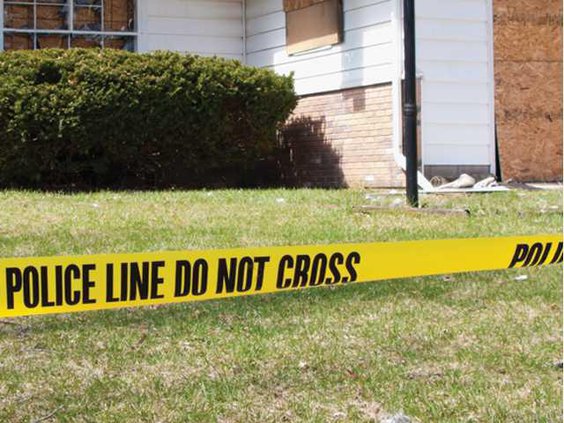Speaking to no one in particular, Ashdown looked at some electrical wiring that had been place into and below the deck of the home and said in a low voice, “This was a fire just waiting to happen.”
As Ashdown examined the wire, he told Riceboro Volunteer Fire and Rescue Capt. Dennis Fitzgerald, “This deck was not wired to code. It’s amazing this home didn’t catch fire sooner.”
As Ashdown further examined the deck, he found two space heaters plugged into the same circuit.
“It looks like this is what may have caused the fire,” he said. “It appears the space heaters may have caused the wires to overheat, eventually melting them and causing them to catch fire.”
Ashdown said the heaters were also to close to furniture which was combustible.
He theorized the fire may have been burning up to 30 minutes before the smoke alarms in the residence sounded.
“They had ionization sensors which came with the mobile home manufactured in 1986. It looks that by the time they (fire victims) were alerted, the home had already filled up with dark smoke making it difficult for Smith to see and find her way out.”
Ashdown said there are new, more sensitive detectors on the market that can alert a resident of smoke in the home within 30 seconds.
“They now sell photoelectric sensors which are more sensitive then the ionization sensors that are installed in most homes,” he said.
Ashdown is not recommending discarding the ionization sensors, but said it’s a good idea to place the photoelectric sensors next to them.
“A lot of the ionization sensors were hard wired with the homes. You can purchase one at a local department store and just stick it up next to the existing one,” he said.
Ashdown recommends installing one in each room of the house.
There were also several other factors that may have contributed in the deaths of the two women, he said.
Know your surroundings
Ashdown said it’s always important to be familiar with your surroundings.
“This may sound crazy, but where ever I go, to a restaurant or while visiting a friend’s home, I am always studying ways to escape in case of a fire.”
In a 9-1-1 call placed by Smith, she could told the operator she was trapped in the fire with no way out.
“The operator at one point asked her if she could get out through a window and Smith said no,” he said.
It was later learned Smith was at the home that weekend to take care of her 96-year-old mother while a sister, who lived in the home, house-sat for a couple during the Thanksgiving holiday.
Have an escape plan
“An escape plan is very important.” said Ashdown. “A few minutes studying your surroundings may make the difference between life and death. In this case, Smith was plunged into dark ness by the thick smoke and apparently became disoriented.”
Never block escape routes
Another factor that played prominently in the tragedy was the front door of the home was blocked by furniture.
According to Ashdown, Sapp, who lived in the home for more than 20 years, was afraid of intruders getting into the home through the front door.
“I was told she blocked this exit in the event anyone tried to break in. But unfortunately, it was the only exit to the home besides the windows and it was blocked.
“We know that Smith tried to open the door, but was unable to do so,” he said. “Never block an exit, all avenues of escape should be easily accessible in the event of an emergency.”
Hire a professional
Ashdown tackled the subject of having electrical work done.
“Get a licensed contractor to do any type of electrical work. In this case it is evident the wiring was not up to code,” he said.
Stay calm
Another factor that could make the difference between life and death is remaining calm during a crisis — something that is understandably difficult to do.
Smith placed a call to 911 shortly after 12:30 a.m. and tried to give the operator the address, but was unable to be understood because she was screaming.
The operator asked her to calm down and repeat the address so emergency personnel could be dispatched.
Use land line to call 911
It is not also uncertain whether Smith placed the call using a cell phone or land line, according to Liberty County Communications Director Tom Wahl.
“The problem with using a cell (phone) to report something like a house fire is the information (such as the street address) is not displayed on the operator’s screen. It gives absolutely no information,” he said.
Wahl noted if a land line is used, basic information is available to the 9-1-1 operator.
“We still need to verify the street address because we want to make sure the person didn’t move over the weekend and the records hadn’t been updated through the phone company, or in the case of a business which has several locations and one billing address,” he said.
Wahl reiterated the need to remain calm.
When speaking with the operator try to remain calm and bear with the questions the operator is asking, he said, noting, “All they are trying to do is get as much information for the emergency personnel who are being dispatched.”
He said the issue about the lack of information from cell-phone calls is being rectified, but is months away from being operational. When it does come on board, operators will be able to pinpoint a location on a map from their console.
Additional safety feature
Riceboro Volunteer Fire and Rescue Assistant Chief Earl McGinley said an overlooked device that should be placed in the home is a carbon monoxide detector.
“If you have a home which is heated by propane gas or you use your fireplace for heating, I recommend you install this item in all your rooms. It is better to be safe than sorry,” he said.
Carbon monoxide gas is an odorless gas that claims lives every year.
McGinley also recommends contacting your local fire department and have an audit for fire safety conducted on your home.




